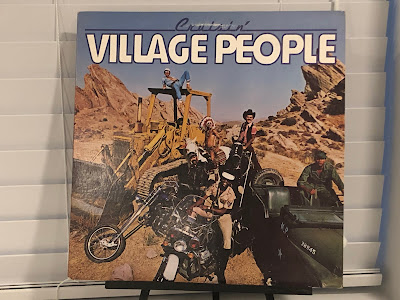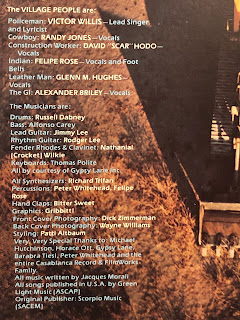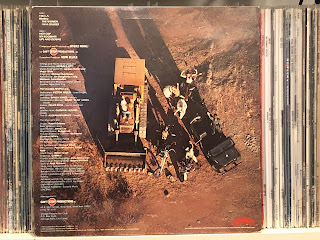It's times like these a really good quote is in order, and Dickens being Dickens wrote a dickens that's perfect for a piece like this:
It was the best of times, it was the worst of times, it was the age of wisdom, it was the age of foolishness, it was the epoch of belief, it was the epoch of incredulity, it was the season of Light, it was the season of Darkness, it was the spring of hope, it was the winter of despair, we had everything before us, we had nothing before us, we were all going direct to Heaven, we were all going direct the other way – in short, the period was so far like the present period, that some of its noisiest authorities insisted on its being received, for good or for evil ...
It's like record labels and producers knew disco wasn't going to last, and the Village People were cranking out albums at an alarming rate trying to take advantage of the trend while it was hot ... after all, who still buys pet rocks? Cruisin' was their second album to drop in 1978 and although only one single was released ... it would change everything. "Y.M.C.A." was the very definition of the term earworm. I may not have been all that enthusiastic about singing along with "Macho Man" but this, this was different ... and it had actions. I'll admit that over the years I've actually grown quite fond of this song.
I never thought I'd buy anything by Village People, or actually succumb to buying an honest to goodness disco record. I'd rather poke myself in the ear with a pair of scissors. Fifteen year old me is very disappointed in this latest turn of events as I will often pick up albums by artists who should not be named, let alone played and talked about in sophisticated (don't worry I don't have any sophisticated friends so it's not really a problem) company - but the truth is this isn't my first disco record. The first disco record I unintentionally bought was by Patrick Juvet. It was one of those dollar finds that could have been anything ... but it wasn't, it was disco. It was an album produced by Jacques Morali and Henri Belolo and the songs were co-written with Victor Willis ... yeah, knowing what I know now that was a huge giveaway. Juvet's album came out in the spring of '78, and Village People would unleash Cruisin' in September of that same year. Like I said, the albums just kept a comin'.
When I first saw Cruisin' in the dollar bin, I just chuckled and kept flipping. Then I went back to it, and checked out the songs on the album. "Ooh, it had 'Y.M.C.A.' Come on, it'll be fun." I said to myself. What was the harm, the album won't turn you gay, you're acting like a homophonic fifteen year old from 1978 ... music isn't like some weird gateway drug. If it was, those Carpenter songs I liked as a kid should have been the slippery sloped to an appreciation for Swedish Death Metal ... Alice Cooper doesn't count.
I paid a dollar, and bought the album.
I left my scissors in the drawer, and ignored fifteen year old self and cleaned the album and put it on the turntable. Oh he was put out, and used a few bad words I shall not repeat here. A lot of what I heard was followed by idiot. Nothing I haven't heard before.
Side two opens with "Hot Cop" a song I'm not really delving into for any real lyrical meaning. I mean, it's no more complicated than singing "Hot Cop" and to drive the point home, Victor Willis was dressed like a cop ... the inference was kind of in your face. My goodness, it's a long song too, clocking in at over six minutes. I suppose if you were out there dancing, longer was better - sitting here I'm just feeling bad for the drummer Russell Dabney. I mean this is a friggin' stamina test.
Next song, same beat, ... and we have "My Roomate" which is well over five minutes of disco magic about a dancing roomate (that's how they spell it on the cover) who takes his buddies clothes and goes dancing, and when he's home plays music really loud and won't let his roomate sleep. Yeah, I'm just waiting for it to end. Closing out the album is another test in endurance. "Ups and Downs" is full of horns, and little synthesizer "pew pew pew" noises and a lot big gang vocals. I'm just kind of glad it wasn't called "In and Outs" considering the constant innuendo throughout the album I don't think it would have been to far out of bounds. Except that hidden in this very upbeat song is a really dark lyrics about addiction, and frankly it's not something I expected to hear in a Village People album.
All in all, this was an endurance test - that was just over half and hour, but felt longer but went by quicker than I thought. I have to admit I played the album over and over again. It was more fun that I had expected, and honestly it still sounds pretty great from a mix perspective. As to the big song, "Y.M.C.A." that song is still bloody catchy. I still want to take a massive dump on disco as a genre, but sometimes you have to allow for exceptions. So this gets a pass. Heck I may as well pull out that Osmonds collection I found a while back that I've been resisting ...
Author's note: I've just finished listening to this again, while I tried to edit and try and make this entry make some sense. Results as they say may vary. If you're still here thank you for your service.
Although I was just a teenage when this came out, it's hard to discount the impact Village People had on society. I mean they weren't great for music (disco dis) but they likely helped move the needle in terms of social justice and acceptance. Considering this was still the late '70s and being gay was still outrageous, many were closeted and that was just how it was. I mean, looking back on my own mind set and behaviour and how casually I'd throw around derogatory slurs and comments like they were nothing is shameful to look back on. Here were a bunch of guys unabashedly owning their identities and even having a ball playing dress up even going so far as to call their third album Cruisin'.
Yeah, I may not have liked disco, but these guys and their silly costumes and music helped change the world.Disco still sucks, but I'll still sing along and do the actions to "Y.M.C.A." even if I can't get the letters in the right order.
This was the classic line up,
Policeman: Victor Willis – lead vocals and lyricist
Cowboy: Randy Jones – vocals
Construction worker: David "Scar" Hodo – vocals
Indian: Felipe Rose – vocals and foot bells
Leather Man: Glenn M. Hughes – vocals
The GI:Alexander Briley – vocals



Comments
Post a Comment